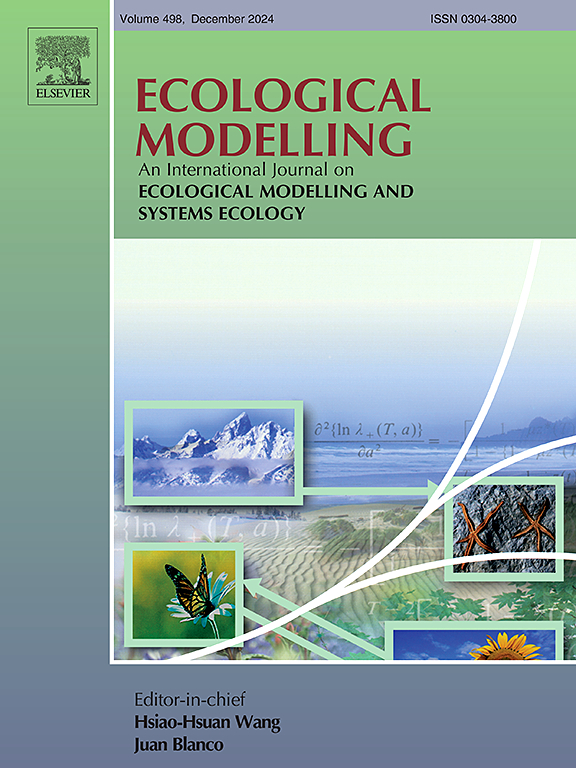将公平和正义纳入海洋生态系统模型:渐进但有意义的方法
IF 2.6
3区 环境科学与生态学
Q2 ECOLOGY
引用次数: 0
摘要
公平的概念是一个复杂和多方面的概念,很难以有意义的方式加以实施。然而,将公平和正义问题纳入环境管理的重要性正在迅速得到各学科的认识,包括长期从事复杂动态系统的海洋科学。考虑到生态系统建模方法能够结合广泛的概念、信息和管理目标,它们可能特别有用。然而,将社会公平纳入生态系统模型被认为是一项艰巨的任务,大多数海洋生态系统模型仍然主要关注鱼类种群、生态动态和结果,忽视了社会影响,这可能会失去帮助改善渔民生活和确定有意义解决方案的机会。在这里,我们提出了在三个不同层次上整合生态系统模型中的公平的方法。从要求多到要求少,我们可以:(1)明确地建立公平模型,(2)稍微调整现有模型以纳入关键的人类成分,以及(3)对现有模型提出新的问题。在我们沿着这些垫脚石前进的过程中,我们必须听取社区合作伙伴和社会科学家的意见,了解需要哪些数据,如何处理“非常规”数据类型,以及哪些指标最有用。为此,我们邀请其他建模者开始以不同的方式思考,敢于提出不同的问题,并汇集知识,以便我们的生态系统模型更好地代表我们所看到的现实。本文章由计算机程序翻译,如有差异,请以英文原文为准。

Integrating equity and justice in marine ecosystem models: An incremental but meaningful approach
The notion of equity is a complex and multifaceted one, and it can be difficult to operationalize in a meaningful way. Nevertheless, the importance of integrating equity and justice concerns in environmental management is quickly being recognized across disciplines, including ocean sciences that have long engaged with complex dynamic systems. Ecosystem modelling approaches can be particularly helpful given their ability to incorporate a wide range of concepts, information, and management goals. However, including social equity in ecosystem models is perceived as a difficult task and most marine ecosystem models still mainly focus on fish stock and ecological dynamics and outcomes, ignoring social impacts, which risks losing opportunities to help improve the lives of fisherfolk and identify meaningful solutions. Here, we propose ways to integrate equity in ecosystem models at three different levels. From more to less demanding, we can: (1) explicitly model equity, (2) slightly adjust existing models to incorporate key human components, and (3) ask new questions with existing models. As we move along these steppingstones, we must listen and learn from community partners and social scientists on what data are needed, how to handle ‘unconventional’ data types, and what indicators are most useful. To do so, we invite other modellers to start thinking differently, dare to ask different questions, and bring knowledge together so that our ecosystem models better represent the realities we see.
求助全文
通过发布文献求助,成功后即可免费获取论文全文。
去求助
来源期刊

Ecological Modelling
环境科学-生态学
CiteScore
5.60
自引率
6.50%
发文量
259
审稿时长
69 days
期刊介绍:
The journal is concerned with the use of mathematical models and systems analysis for the description of ecological processes and for the sustainable management of resources. Human activity and well-being are dependent on and integrated with the functioning of ecosystems and the services they provide. We aim to understand these basic ecosystem functions using mathematical and conceptual modelling, systems analysis, thermodynamics, computer simulations, and ecological theory. This leads to a preference for process-based models embedded in theory with explicit causative agents as opposed to strictly statistical or correlative descriptions. These modelling methods can be applied to a wide spectrum of issues ranging from basic ecology to human ecology to socio-ecological systems. The journal welcomes research articles, short communications, review articles, letters to the editor, book reviews, and other communications. The journal also supports the activities of the [International Society of Ecological Modelling (ISEM)](http://www.isemna.org/).
 求助内容:
求助内容: 应助结果提醒方式:
应助结果提醒方式:


